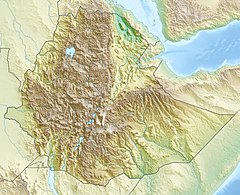Omo River (Ethiopia)
 |
|
| UNESCO World Heritage Site | |
|---|---|
| Location | Ethiopia |
| Coordinates | 4°48′01″N 35°58′02″E / 4.8004°N 35.9671°E |
| Criteria | Cultural: (iii), (iv) |
| Reference | 17 |
| Inscription | 1980 (4th Session) |
|
[]
|
|
The Omo River (also called Omo-Bottego) is an important river of southern Ethiopia. Its course is entirely contained within the boundaries of Ethiopia, and it empties into Lake Turkana on the border with Kenya. It is the principal stream of an endorheic drainage basin; the Omo's drainage basin includes part of the western Oromia Region and the middle of the Southern Nations, Nationalities, and People's Region.
This river rises in the Shewan highlands and is a perennial river. Its course is generally to the south, however with a major bend to the west at about 7° N 37° 30' E to about 36° E where it turns south until 5° 30' N where it makes a large S- bend then resumes its southerly course to Lake Turkana. According to materials published by the Ethiopian Central Statistical Agency, the Omo-Bottego River is 760 kilometers long.
In its course the Omo-Bottego has a total fall of about 6000 ft (2,000 m), from an elevation of 7600 ft at its source to 1600 ft at lake-level, and is consequently a very rapid stream, being broken by the Kokobi and other falls, and navigable only for a short distance above where it empties into Lake Turkana, one of the lakes of the East African Rift. The Spectrum Guide to Ethiopia describes it as a popular site for white-water rafting in September and October, when the river is still high from the rainy season. Its most important tributary is the Gibe River; smaller tributaries include the Wabi, Denchya, Gojeb, Mui and Usno rivers.
The Omo-Bottego River formed the eastern boundaries for the former kingdoms of Janjero, and Garo. The Omo also flows past the Mago and Omo National Parks, which are known for their wildlife. Many animals live near and on the river, including hippopotamuses, crocodiles and puff adders.
...
Wikipedia

